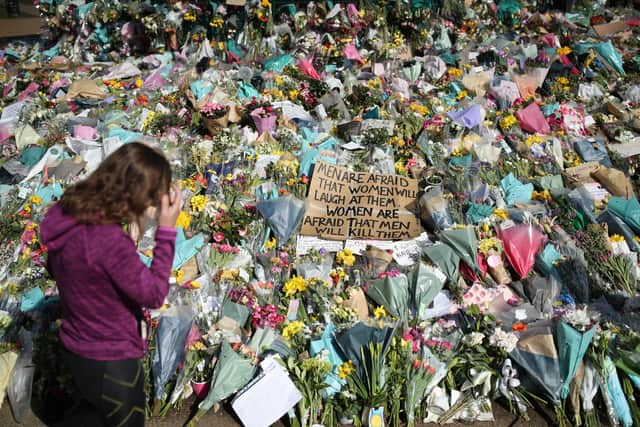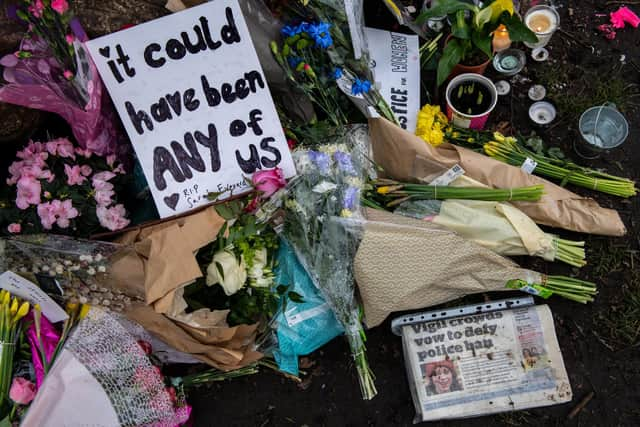The overwhelming problem here isn’t the police, is it? It’s men - Euan McColm
In the aftermath of the sentencing of Wayne Couzens for the murder, while he was a serving police officer, of Sarah Everard, various representatives of the Metropolitan Police offered advice to women on how to keep safe. By mid-morning on Friday, these tips included running away from a police officer if he seems suspicious and flagging down a passing bus during an arrest if something doesn’t feel right.
The Met had been tin-eared on this case since the beginning. Heavy-handed policing of a vigil in London in Sarah’s memory in March of this year saw a number of women manhandled and arrested and it seems senior officers have made no effort, since, to try to understand just why the murder of a woman by a serving policeman has created such a thundering wave of public anger.
Advertisement
Hide AdAdvertisement
Hide AdIt’s par for the course for women to be told how their behaviour - too drunk, too provocatively dressed, too female, too alone - contributes to their victimhood. To see women advised on how they can make it less likely they’ll be murdered by a police officer was a bleak new chapter in the never-ending story of how they should take their share of responsibility for crimes committed against them.


It’s hardly surprising that women continue to feel they’re blamed for becoming victims when people like Philip Allott, North Yorkshire’s police commissioner, continue to hold influential positions. Allott’s contribution to the discussion of Sarah’s murder was to say that she should never had submitted to arrest before going on to say that perhaps women needed to learn about the legal process.
Met commissioner Cressida Dick resisted calls to resign over her officers’ actions during the March vigil but it is difficult to see how she can remain in post. It now appears that Couzens’ behaviour, including two alleged incidents of indecent exposure just weeks before he murdered Sarah, was either tolerated or ignored by his colleagues.
There continue to be difficult question for the Met.
But though it may be guilty of procedural failings, the overwhelming problem here isn’t the police, is it? It’s men.


Inevitably, cases such as the murder of Sarah Everard fuel discussion not just about extremes of male behaviour but about a whole range of actions from the seemingly insignificant to the dangerous.
Equally inevitably, this rouses the “not all men” brigade, that battalion whose response to learning about something like the murder of Sarah Everard is to point out that they’re nothing like Wayne Couzens.
The exhausting need of some men to assert their decency in the face of atrocity is not, I think, going to make the world safer for women.
I’m not sure there is much a man can say about the murder of Sarah Everard or the culture in which it took place that wouldn’t sound, at best, rather trite, right now. It’s easy for men to say that, yes, of course women should be safe to walk the streets without threat of attack but how does that statement of the obvious help?


Advertisement
Hide AdAdvertisement
Hide AdI’m afraid we men have to think a little more deeply than that. We have to think about the fact we live in a society that’s designed to benefit - and dominated by - men. We might talk a good game on equality but words are cheap.
Those men who do not accept that, to some degree, they are part of the problem are, I’m afraid, a greater part of the problem.
When I was a young teenager, my father offered the advice that if I saw a girl walking alone at night on the same side of the street as me, I should cross the road. This, I think, was pretty much the extent of his guidance on making women feel safer.
Men have to have more difficult discussions among ourselves - and especially with our sons - than I had with my dad. We have to talk about the violent pornography which, despite any number of internet filters in the home, we may be sure our children have seen on friends’ phones. If we don’t explain to our children that choking and spitting on women isn’t normal, then who will?
We have to talk about the uncomfortable truth that supposedly harmless “locker room banter” is part of a spectrum with the casual objectification of women at one end their murder at the other. If we are honest with ourselves, which man could say that he has never done something that would sit on that scale?
The spotlight will now shine on the culture of the Metropolitan Police. Special powers of foresight are not required for us to predict that there will be difficult times to come for the force.
It would be surprising if problems uncovered in the Met do not exist in other forces, chief constables across the UK would be wise to begin their own housekeeping.
We will not, however, tackle misogyny within the police force without tackling it across society.
Advertisement
Hide AdAdvertisement
Hide AdI wish I had some great insight that might hasten this process. Of course, I don’t. I’m a man who has enjoyed the benefits of being male for 51 years.
But I can - all men can - recognise that we live in a world where we present a real risk to the safety of women.
After Wayne Couzens was sentenced, talk turned to how women can make themselves safer. As ever, the real issue is how men can make women safer.
A message from the Editor:
Thank you for reading this article. We're more reliant on your support than ever as the shift in consumer habits brought about by Coronavirus impacts our advertisers.
If you haven't already, please consider supporting our trusted, fact-checked journalism by taking out a digital subscription.
Comments
Want to join the conversation? Please or to comment on this article.